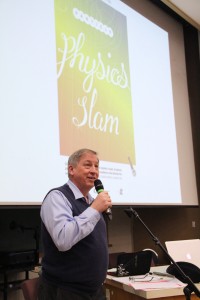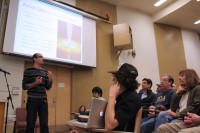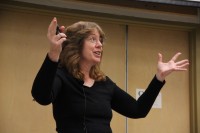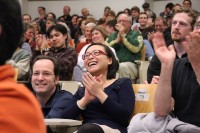
Jim Brau emcees the particle physics slam. Brau is the ILC regional detector contact for the Americas and professor of physics at the University of Oregon. Image: Jack Liu.
Applause-o-meters don’t lie. The 90-decibel-level reading of claps and cheers from the Eugene, Oregon audience indicated that the first-ever physics slam in the US was a hit.
On 22 March, five physicists carried out an assignment to explain in plain and engaging language a topic in particle physics – in only twelve minutes. After all five completed their talks, the audience voted with their applause for the favorite of the competitors, the slam champion.
“The general public is fascinated by particle physics,” said Jim Brau, professor of physics at the University of Oregon and the event’s master of ceremonies. “They showed it with a turnout of 800, their attentiveness and reactions during the presentations, and their unending questions afterward.”
Hailing from Europe as well as the US, the slammers, as the scientist-entertainers were called, presented bite-sized talks on topics such as dark matter and neutrinos. They were in Eugene for the 2011 American Linear Collider Physics Group conference, hosted by the University of Oregon. The slam attracted local residents to learn about their work on the ILC.
In one talk intriguingly titled, “Why physics, dude?”, DESY’s Marc Wenskat introduced the audience to accelerating cavities. If built, he said, the International Linear Collider would require thousands of these cavities – so many that “ILC can also stand for I Love Cavities”.

University of Iowa’s Garabed Halladjian, based at CERN, treats the audience to an explanation of how neutrinos act as astronomical messengers. Image: Jack Liu.
In another presentation, Argonne National Laboratory’s Marcel Demarteau made a bet with the audience that they all had particle detectors in their homes.
“If you win, I will buy you all dinner,” he told the crowd. “If I win, you owe me a beer.”
Had the bet been serious, the local bar would have been tapped out.
Smoke detectors, he revealed to surprised attendees, are particle detectors. Smoke detectors and the gigantic particle detectors in high-energy experiments both rely on the same phenomenon, particle ionisation, to let us know there’s something in the detector worth checking out.

SLAC’s JoAnne Hewett gives her rendition of the dark matter rap, repeating the refrain: “Dark matter: what is it?”. Image: Jack Liu.
“We hope kids will go home and nag their parents to death about getting a smoke detector,” said Demarteau. “Then, the next generation of particle physicists will have been born.”
The idea for Eugene’s particle physics slam was borrowed from similar events in Germany, where science slams have gained popularity. Science slams are related to poetry slams, in which audience members vote on their favorite poetry reading of the competition.
The slam champion in Eugene, University of Oxford’s Brian Foster, talked about hidden dimensions. Beating the clock by only one second, he used a violin, a photo of Einstein’s tongue and examples of previous science revolutions to explain the idea behind string theory. And as with all the slam presentations, the audience ate it up.
“I wish I could distil the enthusiasm and curiosity of the people of Eugene,” Foster said. “If we could bottle it and sell it worldwide we would be able to build an International Linear Collider tomorrow.”
After Brau declared Foster the night’s favorite slammer, the five stuck around for an informal question-and-answer session. They also mingled with attendees who approached them personally with specific questions about the ILC and their work.
“It was so great to see hundreds of people of all ages come out for physics, and to see physicists competing over who can explain their topic in the most understandable way,” said Kate Hulpke of the university’s Materials Science Institute. “Let’s do this again – and again.”
Several audience members also suggested that the university host another physics slam next year.
“It was an impressive evening,” said Wenskat. “The slammers were really entertaining and the people were fascinated. That’s how science should be.”
A video of the particle physics slam will be posted soon on the ILC’s YouTube channel. In the meantime, see local press on the event.


Recent Comments